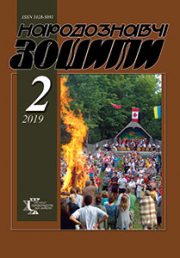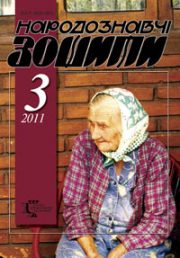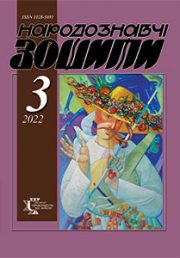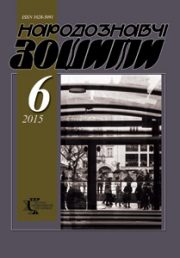The Ethnology Notebooks. 2025. № 4 (184), 990—1003
UDK[398.22(=161.2)-055.2:355.01(477)”20″](092):801.7/.8
DOI https://doi.org/10.15407/nz2025.04.990
KUZMENKO Oksana
- ORCID ID: https://orcid.org/0000-0002-0512-6388
- Doctor of Science in Philology
- (Ph.D. in Folklore Studies), Senior Scholar,
- Leading Research Associate
- of the Department of Social Anthropology
- The Ethnology Institute of the
- National Academy of Sciences of Ukraine,
- 15, Svobody Avenue, 79000, Lviv, Ukraine,
- Contacts: е-mail: kuzmenko.oksana@gmail.com
Abstract. Introduction. Oral autobiographical narratives and testimonies describing the crisis life experience of the «beginning» of the Russian-Ukrainian war constitute invaluable primary source material. This material forms the basis for generating crucial socio-political knowledge regarding the contemporary new type of warfare, and also serves as an object for folkloristic research into the peculiarities of the Ukrainian narrative tradition’s functioning. The creation of a collective metanarrative about the war is an integral component of the national intangible cultural heritage.
The relevance of this study is substantiated by the need to investigate the factors influencing the formulation of oral narratives, drawing upon the accounts of Ukrainian women migrants and internally displaced people. These accounts serve as the foundation for folklore narratives about the war, recorded under conditions of high trust between the narrator and the listener.
The article aims to elucidate the specific features of the textualization of wartime everyday life in a woman’s narrative, specifically one who remained in Ukraine.
The main objectives are: to identify the narrative scheme of the autobiographical female narrative; to assess the amplitude of the interviewer’s influence on the completeness of content and the poetics of the narrative, considering the peculiarities of verbal interaction and co-creation. The source base for the article comprises field material: three interview transcripts, the audio recordings of which were made by the author during March 2022 and July 2023.
The theoretical and methodological foundation of the study includes semantic-structural analysis, narrative analysis of personal autobiographical narrative, the interview method, participant observation, autoethnography, and comparative analysis. The primary factors of textuality that most characterize the manner of (co-)creation of oral narratives about the war are situationality, self-censorship, and subjectivity.
Keywords: oral narrative, Russian-Ukrainian war, autobiographical narrative, women’s war memory, context, own/stranger, textualization, folklorization, intangible cultural heri tage.
Received 20.06.2025
REFERENCES
- Vakhnina, Larysa (2025). The Russian-Ukrainian War in Modern Folklore: An Anthropological Dimension. Collective Monograph. M.T. Rylsky Institute of Folklore of the National Academy of Sciences of Ukraine. Kyiv: Publishing House of Folklore of the National Academy of Sciences [in Ukrainian].
- Kuzmenko, O.(2018). Dramatic Human Existence in Ukrainian Folklore: Conceptual Forms of Expression (the period of WWI and WWII). Lviv; Institute of Ethnology NASU [in Ukrainian].
- Pastukh, N. (2023). The Russian War against Ukraine in the Narratives of Ukrainian Refugee Women in Bielefeld (Germany). Shevchenko Scientific Society, Commission of Folklore Studies, 9.11.2023. Lviv. Retrieved from: https://www.youtube.com/watch?v=KSTI6l02VHo&t=2342s [in Ukrainian].
- Pastukh, N., & Makhovska, S. (Ed.). (2023). Established narrative mechanisms for expressing the experience of Russia’s war in Ukraine. War, Science and Emotions: (Un)new Concepts and Approaches: a collection of roundtable discussions (Chernihiv, 21—22 February 2023) (Pp. 77—80). Kyiv: Yurka Lyubchenko LLC [in Ukrainian].
- Koval-Fuchylo, I. (2024). Narratives of Ukrainian Women about the Refugee Experience. Folklore Fellows’ Network, 58, 6—7. Retrieved from: https://www.folklorefellows.fi/wp-content/uploads/FFN-58.pdf
- Koval-Fuchylo, I. (2023). Two Wars for One Life: Verbalisation of Experience During the War. Journal of Ethnology and Folkloristics, 17 (2), 12—24. Retrieved from: https://doi.org/10.2478/JEF-2023-0015
- Pastukh, N. (2024). Everyday life of the Russian war against Ukraine in the oral histories of Ukrainians (Thematic questionnaire for conducting interviews to record folklore motifs in the narrative tradition about the experience of the full-scale phase of the Russian war against Ukraine). In: Vovchak A., Dovhaliuk I. Folkloristic practice: a study guide (Pp. 168—189). Ivan Franko National University of Lviv. Lviv: HALYCH PRESS [in Ukrainian].
- Labashchuk, O., Harasym, T., Reshetucha, T., & Majbroda, K. (2023). Ukrainian Narratives about the Outbreak of the War: The Main Themes, Structure and Composition. Tautosakos darbai, 66, 13—23. DOI:10.51554/TD.23.66.01
- Engelking, A. (2023). Shot-down towns and burned villages. A memoir story of a Polish village, or about the folklorization of the memory of the Second World War. Text Second, 2, 177—202 [in Polish].
- Kaivola-Bregenhøj, A. (2013). Factors Influencing the Formulation of Narration. In Traditional Storytelling Today. An International Soutcebook. Ed. by Margaret Read MacDonald. New York; London: Routledge, 212—226. https://doi.org/10.4324/9781315061610
- Myshanych, S. (1986). Oral folk stories. Questions of poetics. Kyiv: Naukova dumka [in Ukrainian].
- Kuzmenko, O., & Makhovska, S. (Ed.). (2023). Scientist as a Subject and Object of Field Research: To the Question of the Method of Autoethnography in Wartime. In War, Science and Emotions: (Un)new Concepts and Approaches: a collection of roundtable materials (Chernihiv, 21—22 February 2023) (Pp. 60—71). Kyiv: Yurka Lyubchenko LLC [in Ukrainian].
- Shevchuk, T., & Vakhnina, L. (Ed.). (2025). By the Quiet Danube: Oral Histories of Ukrainian Refugee Women as Ethnography of the Russian-Ukrainian War. In Russian-Ukrainian War in Modern Folklore: Anthropological Dimension. A collective monograph (Pp. 108—121). Rylsky Institute of International and Middle Eastern Studies of the National Academy of Sciences of Ukraine. Kyiv: IIRFE Publishing House [in Ukrainian].
- Bauman, R. (1986). Story, Performance, and Event. Contextual Studies of Oral Narrative. Cambridge University Press.
- Engelking, B, & Grabowskim, J. (2018). The Night Continues. The Fate of Jews in Selected Counties of Occupied Poland (Vol. 1). Warsaw: Association of the Center for Holocaust Research [in Polish].
- The Anthropology of Experience, edit. by Victor W. Turner and Edward M. Bruner. Urbana and Chicago: University of Illinois Press, 1986.
- Hajduk-Nijakowska, J. (2020). The folkloric aspect of contemporary colloquial narratives. Etnolingwistykа, 32, 129—141 [in Polish].
- Lyakh, V., & Pazenok, V.(Ed.). (1996). The emergence of hermeneutics. Modern foreign philosophy: Currents and directions (Pp. 33—60). Kyiv: Vakler [in Ukrainian].
- Shevchuk, O., Makhovska, S., Berezovska, O., & Boryak, O. (Ed.) (2024). Chernihiv in the War: Voices of Eyewitnesses. Chernihiv: Spring Polygraph Publishing House.
- Otrishchenko, N. (Ed.). (2024). Stories from Inside the War. Conversations with Those Who Ask about the War (Pp. 15—24). Lviv: Centre for Urban History [in Ukrainian].
- Otrishchenko, N., & Wanner, C. (Ed.). (2024). The Time that was Taken from Us: Temporal experiences after the full-scale Russian invasion of Ukraine. In: Dispossession. Anthropological Perspectives on Russia’s War Against Ukraine (Pp. 25—44).New York: Routlegue. Retrieved from: https://doi.org/10.4324/9781003382607
- Anthology Film «War throught the eyes of Animal», trailer. Retrieved from: https://www.youtube.com/watch?v=FZNi4Y8ZUZA [in Ukrainian].
- Kozlovsky, I. (2023). Man at the Crossroads. Reflections on existential intelligence. Kyiv: Wheel of Life Publishing House [in Ukrainian].
- Daughtry, J. Martin. (2015). Listening to War: Sound, Music, Trauma, and Survival in Wartime Iraq (New York, 2015; online edn, Oxford Academic, 22 Oct. 2015). Retrieved from: https://doi.org/10.1093/acprof:oso/9780199361496.001.0001 (accessed 5 June 2025).
- Kuzmenko, O. (2023). When Tradition Matters: Prophetic Dreams about the Russian War Against Ukraine in the Context of Ukranian Folk Culture. The Ethnology Notebooks, 5 (173), 1271—1283. Retrieved from: https://doi.org/10.15407/nz2023.05.1271 [in Ukrainian].
- Dudley, K.M., Chamberlain, M., & Thompson, P. (Eds.). (1998). What kind of document is an oral history?In Narrative and Genre (Pp. 160—167). London and New York: Routledge.
- Lutz, C. (1986). Emotion, Thought, and Estrangement: Emotion as a Cultural Category. Cultural Anthropology, 3 (Vol. 1, pp. 287—309).







